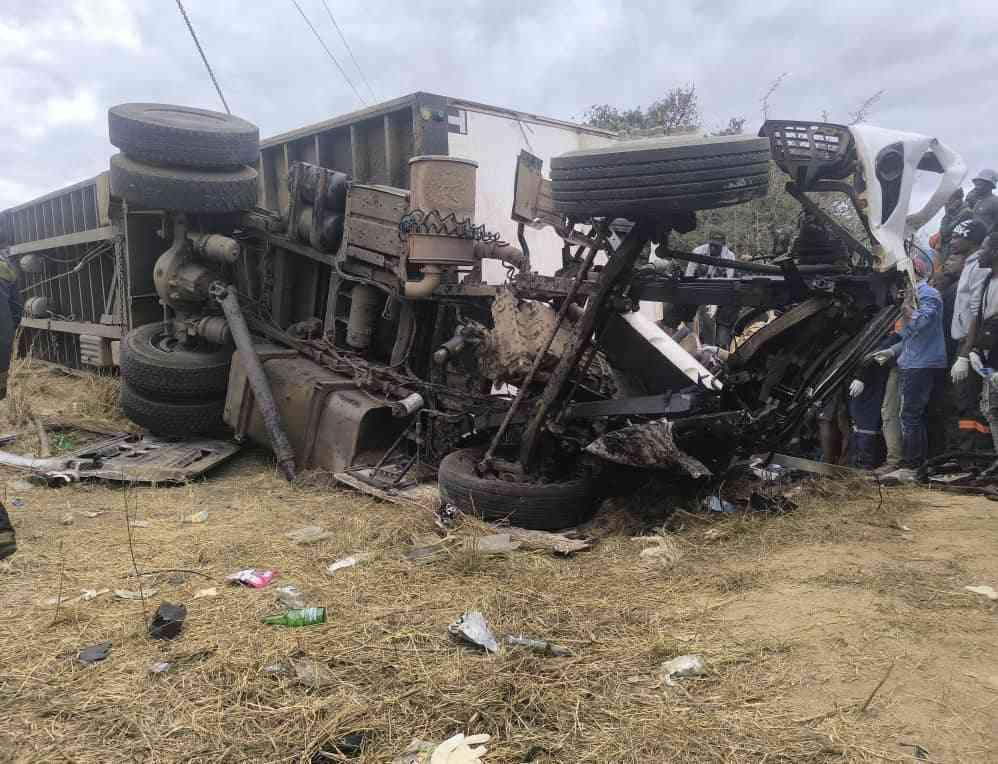Africa-Press – Zimbabwe. A CLOUD of grief and outrage engulfed Zimbabwe this week after 17 innocent lives were tragically cut short in a devastating crash.
According to reports, a haulage truck swerved to avoid a Honda Fit, lost control, crossed into oncoming traffic and collided with a Chitungwiza-bound kombi — crushing it under its weight.
Rescue teams laboured for hours to free the victims, amid the anguished screams of trapped passengers.
Just days earlier, a commuter omnibus accident had claimed a life on the very same stretch of road.
And on Wednesday, another crash occurred between Koala Park Butchery & Abattoir and Maruta shopping centre.
The message is clear: Zimbabwe’s roads have become death traps.
There are many stakeholders on Zimbabwe’s roads and to the motorists and omnibus drivers, we urge the following: drive with discipline and dignity.
Obey speed limits, traffic lights and road signs.
Respect the flow of traffic as if it were made of human lives — because it is.
Banish distractions. Mobile phones behind the wheel are not conveniences — they are weapons.
Even a moment’s glance can turn a vehicle into a tomb.
Share the road with compassion. Motorcyclists, pedestrians, cyclists have no metal shell or airbags. They are vulnerable; they rely on your vigilance.
Embody courtesy. Patience behind the wheel costs nothing. Aggression and impatience cost lives.
To public transport operators, we exhort the following: Maintain vehicles rigorously.
National police spokesperson Commissioner Paul Nyathi’s plea is urgent: Regular servicing is non-negotiable. Mechanical defects are precursors to tragedy.
Ground unsafe vehicles immediately. Traffic Safety Council’s Munesu Munodawafa insists: Any vehicle with defects should not be allowed on the road. Full stop.
Invest in driver training and compliance tracking.
Professional drivers must be skilled, medically fit and held accountable for safety breaches.
To our law enforcement agencies, we ask the following of you: Enforce consistently and visibly. Speeding fines, mobile phone use penalties, overweight hauling enforcement — all must be restorative, not symbolic.
Ramp up roadblocks and random checks. Visibility deters recklessness; it saves lives.
Gather and publish road safety data to guide enforcement priorities — black spot corridors like Chitungwiza demand urgent attention.
And finally, to our legislators and those in government, we urge you to: Fix dangerous roads and design safe infrastructure. Improve signage, install guards, widen narrow stretches and create separate lanes for minibuses and haulage trucks.
Launch a national road safety campaign. Engage schools, churches, civil society — make safety a national culture, not just a rulebook.
Adequately fund emergency response systems.
Too often, post-crash rescue is hampered by lack of equipment or co-ordination, which costs survivors their last chance.
Our country has seen far too many lives being snuffed out on our roads. Unless every stakeholder — from individual motorists to the very heart of government — acts with purpose and urgency, more families will endure grief.
The loss of 17 lives in one crash is not a mere statistic — it is a moral reckoning.
We call on motorists to respect life at every turn, transport owners to uphold the highest safety standards, police to enforce the laws unwaveringly and the government to invest in safe roads and public awareness.
Lives matter more than speed, more than cargo, more than convenience. Let this tragedy be a wake up call: safety is not optional. It is a shared, sacred duty.
For More News And Analysis About Zimbabwe Follow Africa-Press






